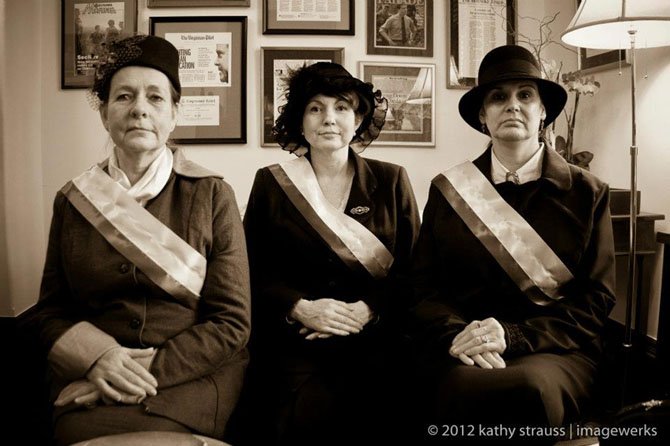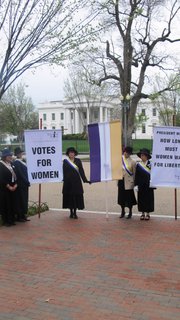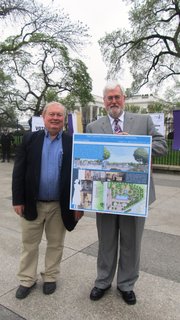Reeanctors of the Silent Sentinel protest accompanied members of the Turning Point Suffragist Memorial Association to Capitol Hill after staging a reenactment of the historic protest in front of The White House on Wednesday, March 21. The reenactment, held during Women’s History Month, commemorates passage of the 19th amendment giving women the right to vote. Photo by Kathy Strauss/Imagewerks
Nearly 100 years ago, a group of women stood in front of The White House and launched a revolution without guns or bloodshed.
Instead of throwing bricks, the protesters threw words at a newly-elected President Woodrow Wilson. The women stood silently for months, carrying signs that read: "Mr. President, what will you do for Woman Suffrage? How Long Must Women Wait for Liberty?"
After months of escalating tension – and after 200 suffragists were jailed, beaten and force-fed at the Occoquan Workhouse – Congress passed the 19th Amendment on August 18, 1920, which gave women the right to vote.
The Commonwealth of Virginia was one of 12 states that initially rejected the amendment, subsequently ratifying it on Feb. 21, 1952, 33 years after the amendment became part of The U.S. Constitution.
DRAPED IN PURPLE, white and gold banners, and wearing period clothing, 10 members of the Turning Point Suffragist Memorial Association reenacted the Silent Sentinel protest on Wednesday, March 21.
"We want to keep history alive so that future generations know that women have done this, have been there," said Jane Barker, board chair of the TPSM Association, an all-volunteer non-partisan group dedicated to honoring the lives of the suffragists and establishing a memorial in their honor at Occoquan Park.
"With March being Women's History Month, we wanted to let people know about this important, but little-known, peaceful picketing of the President Woodrow Wilson White House - the first of its kind. They were brave women," Barker said.
The silent reenactors drew several curious tourists, including women's author Penny Colman, who recently published the book Elizabeth Cady Stanton & Susan B. Anthony: A Friendship that Changed the World.
"This is pretty cool. I was speaking at a conference, and I saw this email and thought I have to stop by here," Colman said. "This history is profoundly liberating for women. It challenges status quo."
After spending nearly two hours in front of The White House, and handing out educational leaflets to tourists, the group marched to Capitol Hill to urge lawmakers to support construction of the memorial.
The Turning Point Suffragist Memorial Association is currently fundraising for the creation of a $7 to $9 million memorial at Occoquan Regional Park in Lorton. The group is working with the Northern Virginia Regional Park Authority to see the memorial built before 2020, the 100th anniversary of the ratification of the 19th Amendment.
Architect Robert Beach said the memorial will be located directly across from the former Occoquan workhouse.
Some of the design features for the Turning Point Suffragist Memorial include:
*A memorial wall with 120 plaques for the women incarcerated for the cause, a waterfall and a copy of the "jailed for freedom" pin that Alice Paul gave to the women.
*Entrance plaza gates duplicating the White House gates where suffragists stood as "silent sentinels" in protest.
*Commemorative banners at the entrance, replicating those carried by the suffragists.
*A footbridge into a memorial garden symbolizing the advancement of the movement.
"At a time when the percentage of eligible voters casting a ballot continues to fall, it is important to reflect on how and why women were so long denied the right to vote," said Nancy Sargeant, the media and marketing chair of the TPSM committee. "It’s also important to ‘remember the ladies,’ as Abigail Adams once said, who endured so much to win the right to vote."
"This whole story of women’s contribution to history is mostly invisible," said John Houser, manager of Occoquan Park, and liaison to the TPSM association.
"Just look at all the monuments to men in this area, but try to find monuments to women," Houser said. "The suffragists are American heroes, not just heroes for women, and they have not been recognized adequately in our history books or our monuments. We’re changing that. "
THE NEXT FUNDRAISING EVENT will be Wednesday, May 20 from 7-10 p.m. at Meadowlark Botanical Gardens in Vienna. For more information about the event and the Turning Point Suffragist Memorial Association, go to www.suffragistmemorial.org.


